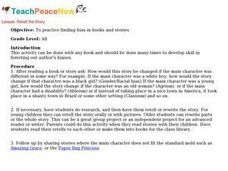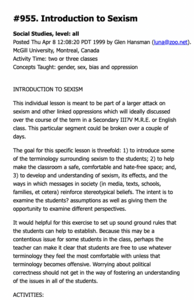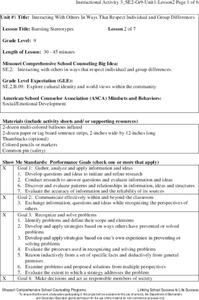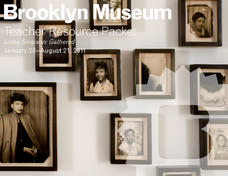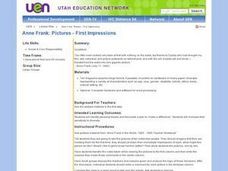Learning for Justice
Mary Church Terrell
Excerpts from an 1898 speech by civil rights activist Mary Church Terrell offers young scholars an opportunity to investigate how Black American women fought for civil rights long before Rosa Parks and the civil rights movement of the...
Anti-Defamation League
Women's Suffrage, Racism, and Intersectionality
The Nineteenth Amendment granted women the right to vote—as long as they were white. High schoolers read articles and essays about racism in the suffrage movement and consider how intersectionality played a role in the movement. Scholars...
Anti-Defamation League
Is Gaming a Boy's Club? Women, Video Games and Sexism
High school juniors and seniors investigate the representation of women in video games. They watch a video of researcher Anita Sarkeesian who describes the response to her research attempts, and read articles related to the topic. To...
Anti-Defamation League
Matthew Shepard and James Byrd, Jr., Hate Crimes Prevention Act
You, too, can prevent hate crimes! Middle and high schoolers read short biographies of Mathew Shepard and James Byrd, the two men for whom the Matthew Shepard and James Byrd, Jr. Hate Crimes Prevention Act (HCPA) is named. After learning...
Wadsworth Atheneum Museum of Art
Can Girls Do That?
Why be limited by stereotypes? Young scholars examine a series of works of art, list the different ways boys and girls are represented, and then discuss the common stereotypes found in the works. They then search for art that does not...
Roy Rosenzweig Center for History and New Media
The Revolutionary Times as Seen Through the Eyes of Women
The role of women before and during the American Revolution changed dramatically. To gain an understanding of these changes, middle schoolers analyze primary source documents, including letters from women that supported the patriot cause...
Newseum
The Women Who Made the Movement
Granting women the right to vote was a long time coming and took many efforts. Young historians select one woman involved in the suffrage movement to research. They compare and contrast the depictions of their subject in mainstream...
American Institute of Physics
When Computers Wore Skirts: Katherine Johnson, Christine Darden, and the “West Computers”
Did you know that people, known as computers, performed the complex calculations that are now done by electronic computers? Three of these human computers, Katherine Johnson, Christine Darden, and Melba Roy Mouton are featured in a...
National Woman's History Museum
Ida B. Wells: Suffragist and Anti-Lynching Activist
Suffragette, investigative journalist, and civil rights activist Ida B. Wells is the focus of a lesson that has young historians study the work of this amazing woman. Scholars watch a video biography of Wells, read the text of her speech...
National Woman's History Museum
Real Life Rosie the Riveters
There was more than one Rosie the Riveter. To learn more about the contributions women made to the World War II war effort, groups become expert on different "Rosie" and share their findings in a Jigsaw activity. The lesson concludes...
Anti-Defamation League
Student Dress Codes: What's Fair?
The controversy over school dress codes continues. The debate involves questions like, why is there a policy? Who sets the policy? Who enforces the policy? What is a fair policy? Tweens and teens have an opportunity to engage in the...
Anti-Defamation League
Harriet Tubman on the $20 Bill: The Power of Symbols
How important are symbols and symbolic gestures in society? Middle schoolers have an opportunity to analyze the importance of symbols on American currency with a lesson plan that investigates the controversies surrounding redesigning the...
Teaching Women's History
Georgian Women
Britain was and is a stratified nation. History sleuths investigate the Georgian Era (1714-1830) of British history to gain an understanding of how the roles women played during this period were influenced by class, race, and religion....
Curated OER
"The Story of an Hour" Lesson 1: Teacher's Guide and Notes
Attitudes toward women have changed radically in the last hundred years. The first lesson plan in a six-part unit that uses Kate Chopin's short story "The Story of an Hour" as an anchor text begins with a shared reading of "The Role of...
Curated OER
Retell the Story
Students identify bias in books. In this character education lesson, students read a text and discuss any gender or racial bias which may be present. Students retell and rewrite the story in a fair way.
Curated OER
Fort Wayne's Industrial Girls
Eighth graders explore what life was like for Fort Wayne's "industrial girls." For this industrialization lesson, 8th graders discuss the conditions that the Indiana factory girls worked in as well as their backgrounds. Students also...
Curated OER
Empowered Barbie
Young scholars access prior knowledge of vocabulary on feminism and psychoanalytic theory, and gender schema. In this Empowered Barbie lesson, students recreate a Barbie doll. Young scholars write a reflection on how they...
Curated OER
Japanese Culture
Ninth graders examine the differences in the way genders have been treated in the same society over the course of a nation's history. In this World History lesson, 9th graders study the factors that have caused changes in...
Curated OER
Population Policy-Progress Since Cairo
Students survey the evolution of population policies. They assess the presence of gender-bias in development statistics. They evaluate the nexus of women, development, and population policy.
Curated OER
Introduction to Sexism
Students develop an understanding of sexism, its effects, and the ways in which messages in society (in media, texts, schools, families, et cetera) reinforce stereotypical beliefs.
Missouri Department of Elementary
Bursting Stereotypes
Balloons take on the role of stereotypes in an activity that asks high school freshman to generate a list of different adjectives that are frequently used to describe men and women. Then then attach a stereotypical label to a balloon and...
Brooklyn Museum
Lorna Simpson: Gathered
Lorna Simpson is a photographer who has put together a collection of photos from the 1950s in order to challenge the idea that primary source documents are objective in their portrayal of history. Learners are introduced to Ms. Simpson's...
Curated OER
Tolerance: Gender Issues
Students explore why some professions have been gender-dominant in the past. In this lesson, students identify some professions that have typically had one specific gender employed in the past, then research that job to see when it...
Curated OER
Anne Frank: Pictures - First Impressions
Fourth graders identify personal biases and formulate a plan to 'make a difference. They, hopefully, increase their sensitivity to diversity. Groups of students view photographs of different people, and share their first impressions.
Other popular searches
- Gender Bias Statistics
- Gender Bias Lesson Plans
- Gender Bias Activity
- Gender Bias and Stereotyping
- Gender Bias Role Play
- Gender Bias in Education
- Gender Bias Math
- No Gender Bias
- Literature With Gender Bias
- Gender Bias in Psychology
- Gender Bias Language
- Gender Biased Computer Games
















